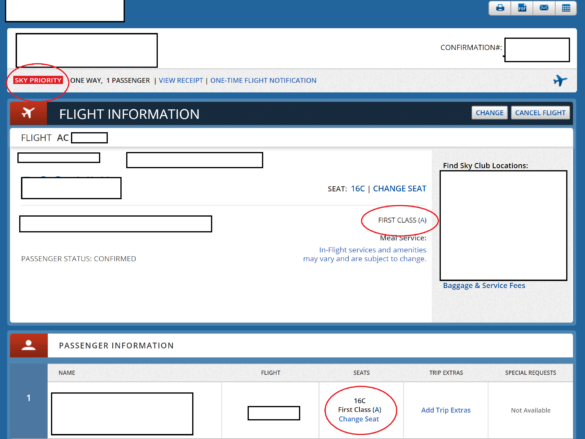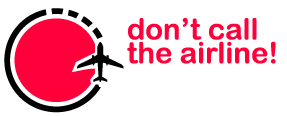Should airlines be responsible for improper fare mapping?
I recently purchased a ticket on Air Canada through Delta.com (it was cheaper!). While ticketed by Delta, the flight is operated and marketed by Air Canada. I purchased an ‘A’ class ticket. On Air Canada, ‘A’ class is in economy. On Delta, ‘A’ class is discounted First/Premium Select. When buying my ticket on Air Canada, Delta marketed this fare as a First Class ticket. However, I’m actually seated in Economy. This is a fare mapping error.

Fare mapping is how travel agents and carriers market a fare class as being in a certain cabin. If done properly, Delta should have correctly mapped ‘A’ class on Air Canada as an economy fare. In this case they applied their own (incorrect) fare mapping, advertising it as a First Class ticket.
My DOT complaint
I submitted a complaint with the US Department of Transportation. I submitted it on the basis of a potential violation of CFR §399.88, Prohibition on post-purchase price increase. I think it’s easy enough to argue that where a carrier sells a ticket advertising a class of service, and including that class of service on the passenger receipt, that by not seating that passenger in the contracted class of service, there’s a post-purchase price increase (e.g. if I asked Delta to correctly seat me in First Class on Air Canada, they would likely demand a change fee and fare difference). I asked Delta, through the DOT, to make me whole by either properly seating me in First Class, or by paying me the difference between what I paid and the lowest-cost premium fare on the ticketed flight.
Considerations
I think there are a number of important considerations here. Airlines create e-ticket interline agreements, which in essence are agreements between airlines that state that party airlines are able to issue tickets on airlines party to the agreement, and that the operating airline agrees to honour the ticket for transport. Airlines are not small entities. Delta brings tens of billions of dollars in revenue annually. Airlines benefit from decades of experience, huge legal teams, and expert industry knowledge. Clearly, there is a massive imbalance of power between an airline and a passenger, who does not usually possess the knowledge and legal resources to competently fight an airline. In the case of fare mapping, there’s an easy fix – Delta would simply program Air Canada’s fare mapping when it identifies an ‘AC’ flight number. I think it’s incumbent on Delta to correctly program their agreements. Is that unreasonable?
On the other hand, I purchased a ticket on Delta for Air Canada that was cheaper than the lowest fare on Air Canada’s website. As a sophisticated consumer, it could be argued that I knew, or ought to have reasonably known, that I was buying an economy ticket, and the First Class notation was a simple IT glitch.

Ultimately, I tend to fall on the side of the consumer. There’s such a significant imbalance of power between an airline and a consumer, that where ambiguous situations arise, policy considerations should tend to fall in the consumer’s favour. We all know that when a consumer makes a simple mistake on an airline’s website, like accidentally typing in a name incorrectly, an airline is certainly entitled to rely on their Contract of Carriage to enforce unfavourably against the consumer. In this case, I’m not buying what is typically known as a mistake fare, which the law entitles the airline to void the contract on the basis of unilateral mistake. I don’t think unilateral mistake applies to improper fare mapping, which at the end of the day is not the result of fat fingers, but a result of the laziness of the airline. Implementing proper fare mapping is not a technical difficulty, and it’s not something that occurs as an occasional mistake. Any ‘A’ fare for Air Canada on Delta advertises itself as a First Class ticket, including on Delta’s receipt.
As a matter of law, a number of conventions speak to the supremacy of a ticket receipt. Historically, the Warsaw Convention gave a great deal of importance to that document, and so does the modern Montreal Convention. While these treaties are obviously not applicable in this case, they demonstrate the importance of proper receipts as evidence of proof of contracting party intentions. A great deal of law (or quasi-law) is written about how to draft a receipt. Airlines spend a great deal of time ensuring the proper formatting and delivery of travel documents. I believe it’s incumbent on airlines to properly draft that document, and any error must be respected in favour of the consumer, due to the imbalance of power and ability between airlines and consumers.
What do you think? Should airlines and travel agents be responsible for improper fare mapping?



You’re right about the imbalance btw consumer vs airline and “should” win your complaint. But like all too many such imbalances, the gov’t tends to side with big business. What was the outcome of your complaint?
Still in process.
Any news on your complaint?
You said this: “(e.g. if I asked Delta to correctly seat me in First Class on Air Canada, they would likely demand a change fee and fare difference).”
Followed by this: “I asked Delta, through the DOT, to make me whole by either properly seating me in First Class, or by paying me the difference between what I paid and the lowest-cost premium fare on the ticketed flight.”
If you didn’t ask Delta first, DOT is much more likely to conclude that you knew Delta had made a mistake, you booked the fare on their website knowing full well that it was in Coach and not what the Delta website said, and that you are just a blogger looking for content. If that’s what you did, DOT will think you are slimy and are going to try to find a way not to help you.
Funny thing is that I agree with you. Delta is likely to have said: too bad, so sad, sit in the back, we’re not fixing it. If you had gotten that from them before running off to the DOT, you would have almost certainly ensured that you would be sitting in First on Air Canada.
I understand your points. You’re right – I did not speak with Delta. However, the reason I did not speak with Delta is because I have significant experience working with them. I know quite well that speaking with them would be a waste of my time.
I wanted to drop a message that I find your legal commentary on the airline/travel world to be quite a fresh perspective and very enjoyable to read. Keep them coming!
Any updates on the resolution?